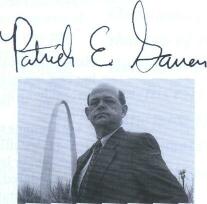 |
Home | Search | Browse | About IPO | Staff | Links |
 |
Home | Search | Browse | About IPO | Staff | Links |
|
A VIEW FROM METRO EAST

It's in our best interests to cultivate good prospects for municipal offices by Patrick E. Gauen A curious thing about some police car repair invoices in the city I covered as a cub reporter decades ago was that there were no patrol vehicles matching the makes and mileages listed. The reason, I eventually learned, was that these invoices from a private garage under contract to City Hall reflected repeated repairs quietly made to the mayor's personal car. Once confronted, His Honor rationalized the expenses, of course. He used the car on business, he said. He got only a part-time salary for full-time effort. But the city council neither authorized the repairs nor knew about them. And if the arrangement was kosher, how come the bills said the work was done on police cars? My story stirred plenty of local political stink but no prosecution. The mayor served out his term and stepped down. I filed that experience in the section of my brain where I keep recollections of the street commissioner who got a city crew to pave the parking lot at his social club. Or the case of city council members who arranged a suspicious no-bid revenue bond issue in which even fractions of a percent in interest were worth hundreds of thousands of dollars to the financing house.
These are hardly isolated examples of things that cause widespread distrust of local officials. Try this: The arrival of a new mayor in East St. Louis 21 years ago brought a promise of amnesty for any workers who brought back purloined public property. Paper clips and typewriter ribbons? Hardly. Cars and bulldozers were missing. The motor from the fire department's rescue boat. Even a steam shovel. Accountability, it turned out, had been a little lax. (Nobody returned anything, by the way.) Show me public assets, I'm afraid, and I'll show you a sitting duck for an audacious thief. And southwestern Illinois has recently suffered some dandies. One turned out to be Callie Mobley, the gregarious mayor of Alorton who convinced quite a few of us that she was a reform-minded leader for the impoverished village of 2,800 people at the eastern edge of East St. Louis. Even the federal judge who sentenced her to 30 months in prison seemed to appreciate her bold leadership skills. She was so bold, in fact, that authorities said she paid herself nearly a quarter of a million dollars in excess salary and padded her benefits with improper services by municipal workers on property she owned. (She agreed to restitution of $140,000.) A few miles away in Brooklyn, a village so poor that four children burned to death several years ago for want of an operable fire truck, it was the city clerk who got snared by the feds. Frankie Banks took $143,000, according to her plea. She awaits sentencing. More recently, Brooklyn Mayor Ruby Cook, halfway through her second term, was separately charged with stealing at least $20,000 from the community. This came after she repeatedly told inquiring town trustees that the financial books were none of their business. Lest these episodes suggest that accusations of stealing from a public trust are strictly a crime of poor black urban communities, consider the situation in Marine. The white Madison County farm town of 1,000 is the classic everybody-knows-everybody and nobody-locks-their-doors community. But somebody should have locked the village accounts, according to charges pending against Janice Bryant. She stands accused of taking more than $100,000 in her role as municipal treasurer. That's not counting a separate allegation that she stole $2,350 from the town's Homecoming Association. Surety bonds may repay losses in some of these cases. But no bond can replace the loss of public faith that fuels jeers from jaded voters and keeps some of our brightest citizens from seeking spots on the ballot at any level. It is not within the responsibilities of county and state officials to spend time and effort trying to cultivate good prospects for municipal elective and appointive offices in their back yards. But it might be in the best interest of us all if they did. Patrick E. Gauen writes an Illinois column for the St. Louis Post-Dispatch. www.uis.edu/~ilissues Illinois Issues November 2000 41 |
|
|